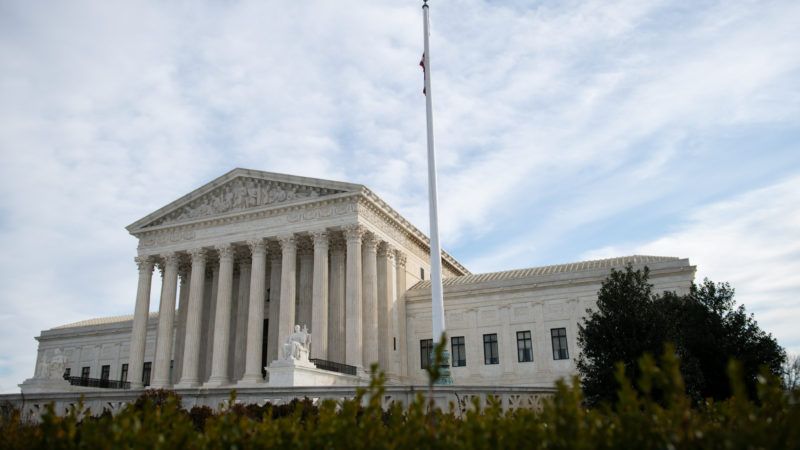These Judges Defend Qualified Immunity as 'a Deferential Rule' That Protects the Police
“Officers don’t have the time to pull out law books and analyze the fine points of judicial precedent.”

Qualified immunity, the controversial legal doctrine that frequently shields police officers from being sued when they violate citizens' constitutional rights, seems to be under fire from all directions these days.
"Qualified immunity protects police and other officials from consequences even for horrific rights abuses," observed Rep. Justin Amash (L–Mich.) when he introduced the Ending Qualified Immunity Act in the House of Representatives last week. "It prevents accountability for the 'bad apples' and undermines the public's faith in law enforcement."
Plenty of non-politicians agree. "More than 1,400 professional athletes, coaches and executives," reported The Los Angeles Times, "signed a letter asking Congress to pass legislation to eliminate qualified immunity for law enforcement and other public officials."
Unfortunately, criticism of qualified immunity is not a unanimous opinion among federal judges. In fact, the doctrine has a number of prominent defenders on the bench, including two influential judicial appointees of President Donald Trump.
According to the U.S. Supreme Court's 1982 ruling in Harlow v. Fitzgerald, government officials are entitled to immunity from civil suits arising from their official conduct so long as the conduct that they're being sued over "does not violate clearly established statutory or constitutional rights."
"That's a deferential rule," observed Judge Amul Thapar, a Trump appointee who sits on the U.S. Court of Appeals for the 6th Circuit. He meant deferential as a compliment. "Officers often find themselves in positions where they must make split-second decisions in dangerous situations," Thapar wrote in Howse v. Hodous (2020). And in his view, federal judges should not be playing Monday morning quarterback when it comes to such matters. "In those crucial seconds," Thapar insisted, "officers don't have the time to pull out law books and analyze the fine points of judicial precedent."
Judge James Ho, a Trump appointee who sits on the U.S. Court of Appeals for the 5th Circuit, has also praised qualified immunity for the broad judicial deference that it gives to the cops. "We have no business," Ho wrote in Winzer v. Kaufman County (2019), "second-guessing split-second decisions by police officers from the safety of our chambers."
Thankfully, not every member of the federal bench sees the issue that way. Judge Don Willett, another Trump appointee to the 5th Circuit, complained in a 2018 case that when it comes to qualified immunity, "merely proving a constitutional violation doesn't cut it; plaintiffs must cite functionally identical precedent that places the legal question 'beyond debate' to 'every' reasonable officer." In other words, Willett explained, the doctrine lets "public officials duck consequences for bad behavior—no matter how palpably unreasonable—as long as they were the first to behave badly."
Justice Sonia Sotomayor is no fan either. The Supreme Court's current qualified immunity doctrine "tells officers that they can shoot first and think later," Sotomayor wrote in dissent in Kisela v. Hughes (2018), "and it tells the public that palpably unreasonable conduct will go unpunished."
Here's a telling example of what qualified immunity's "deferential rule" looks like in practice. In Latits v. Phillips (2017), the 6th Circuit concluded that a Michigan police officer violated the Fourth Amendment when he shot and killed a fleeing suspect. But the court then went ahead and awarded the officer qualified immunity anyway for his unconstitutional actions. "Although we now hold that [Officer Lowell] Phillips's conduct fell outside the bounds of the Fourth Amendment," the 6th Circuit said, "controlling authority at the time of the events had not clearly established the rights we identify today."
Writing in dissent, 6th Circuit Judge Eric Clay basically shook his head in disbelief. "The majority spends the bulk of its opinion explaining how Officer Phillips' use of deadly force was objectively unreasonable." But "in the final stretch," Clay marveled, "the majority abruptly shifts gears to hold that [the plaintiff's] constitutional rights were not clearly established….In so holding, the majority has created a nearly impossible barrier for plaintiffs seeking to vindicate their rights against government officials."
As I wrote in a 2018 column, "something has gone seriously wrong in our criminal justice system when the courts are running this kind of interference on behalf of blatantly unconstitutional police conduct."


Show Comments (118)